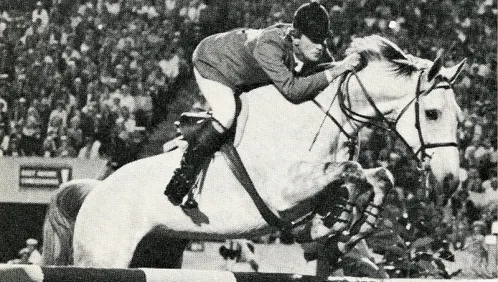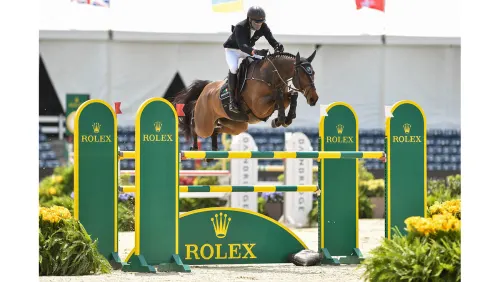Our columnist addresses rule penalty guidelines, competition standards and costs.
The U.S. Hunter Jumper Association has been up and running for six years, and through the work of its members, our sport has experienced some significant advancement. New programs and partnerships such as the USHJA Foundation, hunter derbies, Emerging Athletes, educational clinics, outreach competitions, partnership with the Intercollegiate Horse Shows Association, trainer certification, and the owners, trainers and welfare guides, have introduced new life into our sport.
Competition standards and increased opportunity for new competition approval will further advance our sport in the years to come. Numerous rules regulate conduct in our sports. But for every action that takes place there is a reaction, and as we make changes, we have to be mindful of any unintended consequences of our actions. Questions need to be asked of every rule change proposal: Is this change needed? How will this change make our sport better? Who is the audience this proposal serves? What are the intended and unintended consequences of this change? And how soon does this change need to become effective?
The subject of regulation or the absence of regulation has been in the news, mainly associated with the economic challenges that our country and the world have been facing the past couple of years. A major factor in maintaining a successful economy and a successful sport is finding the right balance between regulation and deregulation. For equestrian sports, this balance must be reviewed and adjusted as needed to take into account economic and sport challenges, or we find ourselves trying to catch up rather than stay ahead of issues.
When most members hear the word “regulation,” they’ll most likely think of rule violations and hearings. The U.S. Equestrian Federation’s hearing process has undergone some significant and successful changes including the move to assigning Hearing Panels, as opposed to the old method in which whoever shows up constituted the Hearing Panel.
The next step is to develop a set of general penalty guidelines for the various rule infractions. This project is long overdue, and we need to get moving on this now. There is an extensive history of past cases, including the violations and their applicable penalty, which will help us in achieving this goal. Of course, penalty guidelines are just guidelines. Specific conditions of each individual case may result in an increase or decrease of the penalty. Multiple offenses within a certain period of time may also result in an increase in the penalty. Creating guidelines will streamline the process and build member confidence in the system. Members want to understand which penalties apply to which violations.
While developing penalty guidelines, we need to think about our rulebook. Our USEF Rulebook seems to grow in size every year. We must periodically examine the rulebook in order to remove extraneous rules and to simplify the language so that our rules are not subject to such varied interpretation. This will reduce confusion and maybe make the book smaller. We should consider if there are components of rules which could be contained on the USEF website and whether this is a good direction for us to take.
ADVERTISEMENT
Mileage Rule Keeps Standards Up
Regulation is not only about rule violations and hearings; it’s about the conduct of our sport. At a retreat not so long ago, a member asked me if I believed in free enterprise. I responded that I did, but with reasonable restrictions. I bring this up because I believe it’s relevant when we talk about competitions and the mileage rule. In the world of franchising, you rarely see two of the same franchises next door to each other. Franchises have rules that regulate their location, price of goods bought and sold and other conditions of operation. Regulating competitions is a necessity of the USEF and our sport.
We have recently approved standards for each level of competition, and mileage protection will become much less of an issue and barrier of entry into the marketplace as the level of standards increase. Some members want to dispose of the mileage rule because they believe that a free market system will result in better competitions.
All you have to do is look at the Northeast, Zones 1 and 2, to see the result of deregulation. In these zones, some years ago the distance between “AA” and “A” rated competitions was reduced from 250 miles to 125 miles. This resulted in more competitions, but many members will tell you that many competitions do not meet the standards that members feel they should. If you remove mileage protection, you remove the reward for competitions to meet or exceed the required standards in order to obtain their rating and competition license.
Keeping Costs Down
I hear a lot of discussion that rules should be made to limit the fees charged by management at competitions. To most this sounds reasonable, but if we go this route, are professionals also ready to limit the fees they charge exhibitors? Are service providers ready to limit their fees?
Is it fair to require limitations on one group of people and not others? There is more to this discussion than just saying we need to limit competition fees.
ADVERTISEMENT
To get to the heart of the matter, we have to examine our sport and discuss why people compete. This is an issue to confront and delve into over the next year. We must discuss how prize money, economics and growing the sport figure into the puzzle across the entire country. It seems that every time we increase prize money, it results in increased competition costs, which results in a decrease in competitors staying in the marketplace and deters new competitors from entering the marketplace.
Decreasing the opportunity to enter our sport is not going to provide for long-term sustainability of the sport. We also have to remember that the sport does not just exist on each coast and at the “AA” and “A” levels. There is the remainder of the country and its members that must be considered in the process.
Increasing participation has to be a priority, and we need to be considering changes that will enable this to happen. In the past 15 years we have witnessed increasing competition requirements including prize money, required days for competitions, required divisions and much more. Now that there is less disposable income and less participation, the opportunity is here to review these requirements and make some adjustments that make sense.
We need to provide a reasonable amount of flexibility for competitions to offer what works for their constituents. We must develop ways for people to afford to compete in our sport. One way I see of creating more entry into the sport is to develop an Endorsed Competition system similar to the agreement between the USEF and U.S. Eventing Association. This would allow us to offer a cost-effective method of entry into hunter/jumper competitions for both organizers and participants at the lower levels of USEF-licensed competitions.
To participate in the Zone awards program, exhibitors would only have to be USHJA members and register their horses with USHJA. For national awards participation and to qualify for and compete in national finals and championships, competitors would also have to be USEF members and record their horse with the USEF. Drug testing at these Endorsed Competitions would be part of the agreement between USHJA and the USEF. Throughout 2011, the USHJA Affiliates Council will continue developing the parameters of this type of program so that we can begin establishing this new path of entry into our sport.
We have come a long way in a short time, but there is much more to accomplish to make our sport the best it can be. None of the answers will come easily, and all will require careful thought and consideration. It will take time, but in the end, I truly believe that we will create an environment that will satisfy our current members and attract new members.
Bill Moroney, Keedysville, Md., is president of the U.S. Hunter Jumper Association, a member of the U.S. Equestrian Federation Board of Directors and a USEF R-rated judge. He started writing Between Rounds columns in 2004.















